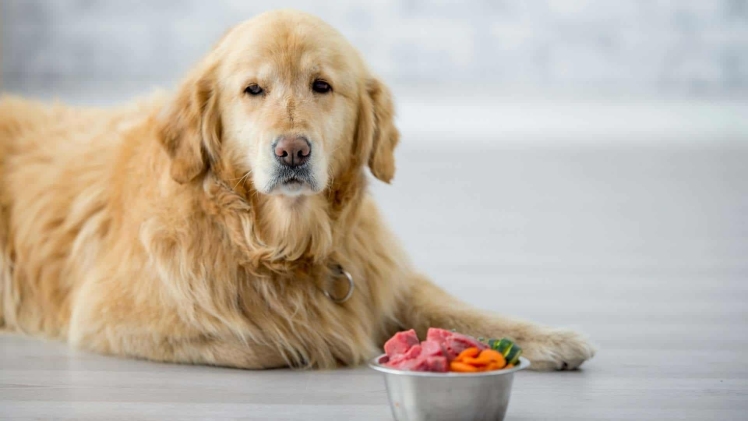You’re at the pet store looking to buy food for your new dog. You’re excited about the new addition to your family, and you want to feed him the best. But when you get to the dog food aisle, you freeze at the dozens of bags and cans and brands. How will you know what’s best for your pup? There are endless choices.
You may be tempted to go with the most expensive option because that’s usually the best, right? Or what about the bag with the well-known celebrity on it? Or how about the food that claims it’s veterinarian-approved? Knowing the best food to keep your pet healthy can be a challenge. Let’s look at what your dog really needs so you can make the best decision for Fido’s feeding.
What are the nutrients your dog needs?
When it comes to feeding our canine friends, most experts agree on six key nutrients that dogs need. Dogs need proteins, fats, carbohydrates, vitamins, minerals, and water. Why do these nutrients matter for dogs? Let’s take a quick look at each of them.
Proteins
Proteins are crucial to a dog’s diet, They help develop muscles, tendons, and ligaments and strengthen their skin and nails. As proteins break down, they create amino acids essential to a canine’s development. These amino acids cannot be created by the body and must be provided in the dog’s food.
While kibble is a common and convenient option for feeding dogs, it’s important to ensure that it contains quality proteins. Not all kibbles are created equal. Some lower-quality dog foods may use lower-grade protein sources or include fillers that provide less nutritional value. A better option might be fresh dog food with high-quality proteins like beef, chicken, or pork.
Fats
You get home from an exhausting day at work, but Fido is ready for you to take him on a walk. Why? He has energy! Fats play a key role in giving dogs energy to run and play. They’re also essential in developing a dog’s coat and healthy skin.
Carbohydrates
Speaking of energy, carbohydrates play a vital part in producing energy in your dog. But energy production can come from fats as well. So why are carbs important? They contain fiber, which plays a big role in a dog’s digestive health.
Vitamins
Vitamins are nutrients that aren’t adequately produced by a dog’s body but are important to their health. Just like humans, dogs need vitamins to help with various functions. Vitamins are essential for bone development, blood-clotting, and a dog’s vision. They also help with neurological development.
Minerals
Your dog needs minerals, some more than others. They’re chemicals that work to help biological functions run smoothly. Calcium, potassium, and iron are just a few key minerals a dog’s body needs for healthy teeth, bone, and muscle. Minerals are also beneficial in brain health.
Water
Just like you, your dog needs fresh water and plenty of it. In fact, their water intake should be roughly 2.5 times the amount of food they get each day. Water helps regulate a dog’s body temperature and helps to break down carbs and fats. It also helps keep the joints lubricated.
Where can you get these nutrients for your dog?
When you’re at your local pet store or browsing online for fresh pet food, make sure these nutrients are included. The ingredient labels should mention protein, fat, fiber, and water. Many foods provide these nutrients with sources such as chicken, beef, or fish. The American Kennel Club provides some excellent tips on reading dog food labels.
Along with high-quality meat sources, there are many fruits and vegetables that provide nutrients for dogs. Foods such as carrots, pumpkin, sweet potatoes, and blueberries can be extremely beneficial for canine health. Be mindful with any food you give your dog that allergies can pop up unexpectedly. If you suspect your dog has an allergy to chicken, for example, read labels carefully to find poultry-free food.
What else should you consider when feeding your dog?
While all dogs need the same key nutrients, the amount of what they need can vary. There are various factors to consider when feeding your dog such as their breed, age, and weight.
A dog’s breed matters in terms of their activity level. A more active dog like a border collie will need a higher daily caloric intake than a bulldog. Bulldogs are less active and won’t burn off calories at the same rate more active breeds will.
When it comes to your dog’s age, generally speaking, the younger they are, the more food they’ll need. Puppies are growing and need plenty of nutrients. Adult dogs may not require quite as much. Senior dogs may require a special diet and less food. It’s always recommended you check with your dog’s vet before altering their diet.
If your dog is underweight or overweight, you’ll likely need to change how much and how often they’re fed. Also if your dog is in a kennel much of the day, they’re less active and likely need less food than a dog that gets plenty of daily exercise.
Be Informed When Feeding Fido
There’s a lot of great information available when it comes to feeding your dog. It’s important to consider the quality of food and whether or not it has all the essential nutrients your dog needs. Whether you choose fresh dog food or something else, be sure Fido is getting all he needs to stay healthy and happy.

